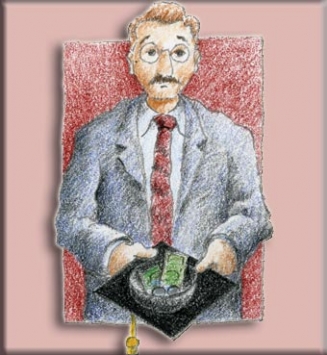Glaring double standards on workers' rights are far from a class act.
When you think of the typical college professor the image of a tweed-afflicted, facial-haired gentleman with a penchant for pipe smoking and an inability to locate his house keys may come quickest to mind. But these days when the real college professor stands up, he may look more like an overtired migrant worker in the fields of academia than a lovably bumbling Mr. Chips.
The U.S. Department of Education reports that back in 1975 most college faculty were already tenured or on their way to it. Less than 30 percent were "adjunct professors," full-time lecturers without a shot at tenure.
Today the situation has essentially reversed. A glowering crowd of threadbare adjuncts put chalk to board in more than 50 percent of America's college-level classrooms. It's not hard to understand why. Adjunct profs are paid an alarming fraction of the pay-per-class that tenured staff receive and labor without benefits of any kind.
The advent of the adjunct has created a new class of overeducated poor in America, and nowhere has this emerging category of exploited worker been more apparent than within the extra-hallowed halls of America's Catholic universities.
At the Jesuit Marquette University in Milwaukee, fellow academics have called the question, citing basic fairness both to tuition-paying students and food-stamp receiving adjuncts. In 2008 Marquette's theology department unanimously passed a motion demanding health care benefits for all professors teaching at least two classes.
"Marquette teaches Catholic social doctrine, which includes the principle that basic health care is not a luxury but a basic human right which must be honored," professor Daniel Maguire told the Marquette Tribune.
"We looked at Catholic teaching, looked at what we're doing, and all agree that we must fight to change it." The matter is now before Marquette's academic senate.
You would think that the Catholic Church-after speaking out over decades for a just wage, humane working conditions, and health care and other benefits meant to allow all workers to pursue some happiness-would not have to suffer the indignity of such an embarrassing showdown over labor rights at one of its finer institutions.
The sad truth is, however, that when it comes to matters of workers' rights and employers' responsibilities, the church has long said all the right things and then felt free to do the opposite with its own employees.
In recent years union-busting activities at Catholic schools, hospitals, even individual parishes portrays an impressive hypocrisy on worker rights. In Scranton, Pennsylvania a long-standing Catholic school teachers association has been locked out by Bishop Joseph Martino. In suburban Chicago a lengthy and acrimonious dispute between the Resurrection Health Care network, administered by two religious orders, and its union-leaning staff continues to produce embarrassing headlines and store-front protest posters among local merchants.
The church has staked out the moral high ground on worker rights for the entire secular world to see in a parade of papal encyclicals more than a century long. It was labor priests like George Higgins, Jack Egan, Charles Owen Rice, and Decatur, Illinois' Martin Mangan who stood shoulder-to-shoulder beside workers in some of the great labor struggles-won and lost-that helped define the American way of life.
These days Catholic leaders are stepping up a national effort to reassert the U.S. workers' right to unionize. Ensuring that adjunct professors escape from the kind of exploitation other categories of workers have already experienced may seem an odd way to get back in the game, but if we can't get this right, how can we ask anyone else to?
It's time to put our money and human resources departments where our good intentions are. We need to take care of the people working within our walls if we want to take a stand for everyone else working outside them.
This article appeared in the July 2009 issue of U.S. Catholic (Vol. 74, No. 7, page 46).














Add comment